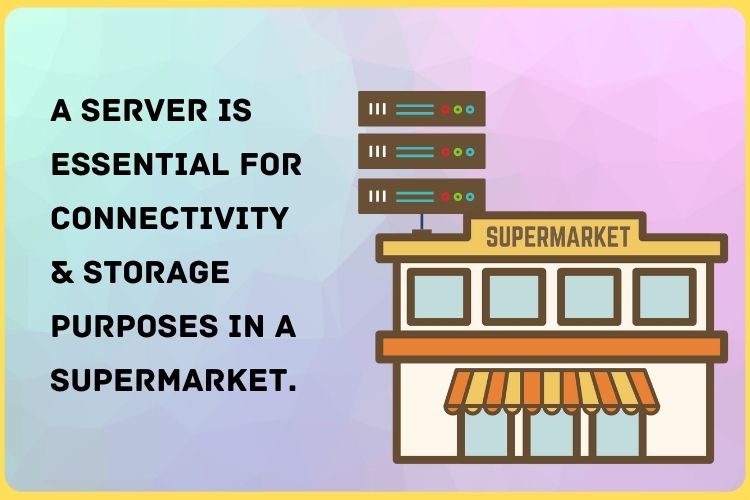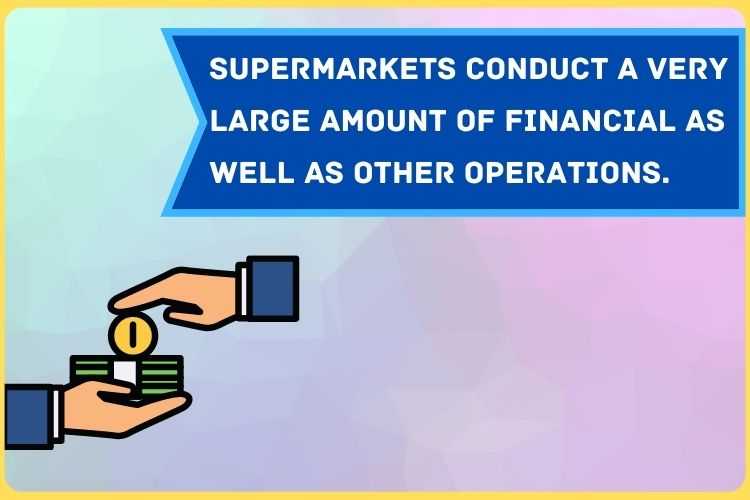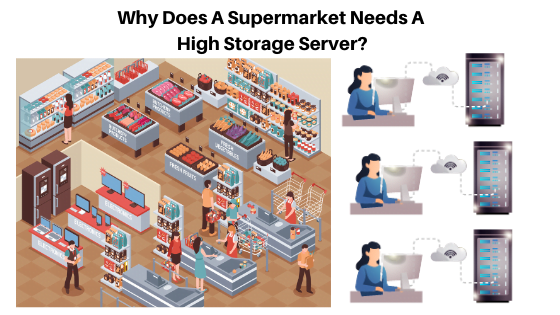Table of Contents
When your supermarket is established & you start receiving a good amount of customers you need to keep your transaction data, inventory data secured somewhere. There are two ways you can do it either get a cloud server or go with a high storage server at your premises. This kind is safe because you have the product on your premises as cloud servers have the risk of getting hacked or data leaks that can harm your supermarket system.
What is Server hardware?
A server refers to a main body or device which keeps all the other devices connected and functioning. All the other devices which are connected with the server a referred to as clients. This kind of connection system of computers is known as a server-client system.
Every single client which is connected to the server can be operated and controlled through the server. And all the other client storage devices used in supermarkets can also share the resources and services of the main server. A server, therefore, is essential for connectivity & storage purposes in a supermarket.

What are the purposes of a server in a supermarket?
With the advent the technological innovations, every important task can now be done by the way of the internet. In different fields and aspects, computers have proved to be of great assistance. Supermarkets and grocery centers are not an exception to this.
Some of the important functions of a computer server in a supermarket computer system can be found listed below:
1. Keeping transaction records
Most of our life needs to depend on supermarkets these days. This is because we are made available every single type of item under the same roof. Every single day, hundreds of people visit supermarkets to buy their groceries and other items of daily needs. This results in a large number of transactions which take place in the supermarket.
It is very important for the supermarkets to keep a record of how much did they sell in a particular period of time and what their profitability was. However, this will be a really, time and effort taking task if done manually.
The storage server systems in the supermarkets help to store the data of all the transactions which take place in the supermarkets.
2. Inventory management
Supermarkets store a very large variety of goods and products in large quantities. To make sure the availability of the products at all times, it is important for the supermarkets to keep a record of all the items which they have possible by way of data servers.
3. Connectivity
Above all, interconnected devices provide an easy mechanism for the sharing of data. Any information can be sent from one of the server’s connected devices to another. They have to process a very large amount of information in a short time, which is why is imperative for the storage servers to be capable of holding large amounts of data.
4. Monitoring & Surveillance
With 1000s of people visiting your supermarket you need to focus on your supermarket security. People have tendencies to steal objects when the supermarket is crowded for this you need to invest in CCTV storage servers which are most important when you are setting up a business.

Why should the storage quantity of supermarket servers be higher than the average server?
Supermarkets conduct a very large amount of financial as well as other operations. This is also done very quickly because of the lack of time and speedy amazement. This is why it is very essential for the supermarkets to make sure that the server has High storage and high processing capabilities.
It also helps in quick data transfer and retrieval from one place to another. So, now it is clear why the supermarkets needs a high storage server system.
Conclusion
So if you’re looking to purchase a high storage server or planning to buy one for your Supermarket you can customize your requirement in Serverstack.

Frequently Asked Questions
Q1. What are the types of server hardware?
- File servers
- Print servers
- Application servers
- DNS servers
- Mail servers
- Web servers
- Database servers
- Virtual servers
- Proxy servers
- Monitoring and management servers
Q2. What are the parts of a server?
- Motherboard
- Processors
- Memory
- Hard drives
- Network connections
- Graphics cards
Q3. What are the types of server storage?
The four server storage types are:
- Direct Attached Storage (DAS)
- Network Attached Storage (NAS)
- Storage Area Networks (SAN)
- Cloud Storage







